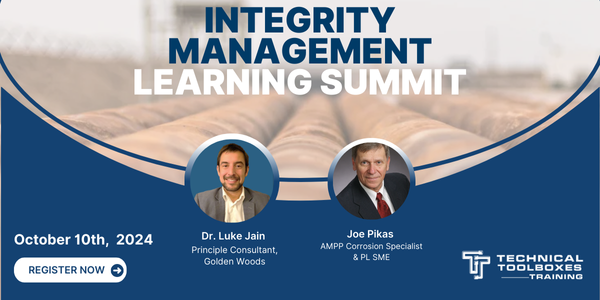Introduction to Pipeline Steels:
Manufacturing, Specifications, Standards, and Metallurgy
Part 1: Composition and Processing
(previously recorded live training)
-
Author: Technical Toolboxes
-
Level: Beginner
-
Study time: 1 hour
Write your awesome label here.
Course overview
(Video Only. No PDH available)
Explore pipeline steel, covering alloys, failure reasons, achieving desired properties, microstructure phases, effects of elements, and the balance between composition and weldability. Grasp hardness versus hardenability, steel-making processes, challenges in specifying composition, and historical standards like API 5LX (1963) and API 5L 45th edition (2013), PSL 2 Pipe. Investigate elevated temperature effects, postweld stress relief, and cooling methods. Gain insights into phenomena like decarburization and tempering effects on hardness, along with details of tensile testing.
Explore pipeline steel, covering alloys, failure reasons, achieving desired properties, microstructure phases, effects of elements, and the balance between composition and weldability. Grasp hardness versus hardenability, steel-making processes, challenges in specifying composition, and historical standards like API 5LX (1963) and API 5L 45th edition (2013), PSL 2 Pipe. Investigate elevated temperature effects, postweld stress relief, and cooling methods. Gain insights into phenomena like decarburization and tempering effects on hardness, along with details of tensile testing.
-
Video time: 1 hour
Bill Amend
Technical Advisor at RSI Pipeline Solutions (semi-retired): Pipeline Integrity, Metallurgical Engineering and Training
ABOUT BILL
Mr. Amend has provided metallurgical engineering services to the energy industry (oil & gas production and pipelines and geothermal energy production) since 1979. He previously worked with DNV (12 years), Structural Integrity Associates (5 years), Southern California Gas Company (14 years), and Unocal Corporation (12 years).
His areas of expertise include failure analysis, integrity management of early vintage steel pipelines and pipeline welds, in-situ, nondestructive determination of pipe properties, development and review of welding procedures for in-service pipelines and pipeline repair, materials selection for hydrogen pipelines, materials testing and selection for severe geothermal environments, and technical training.
He has served in various leadership roles in subcommittees of API 1104 and has managed and conducted several research projects for PRCI, earning the Distinguished Service Award from PRCI in 2002.
He is a co-holder of three U.S. patents related to the control of corrosion in geothermal systems.
Mr. Amend is a Professional Engineer registered in the State of California. He earned a Bachelor of Science in Metallurgical Engineering from Cal Poly, San Luis Obispo.

